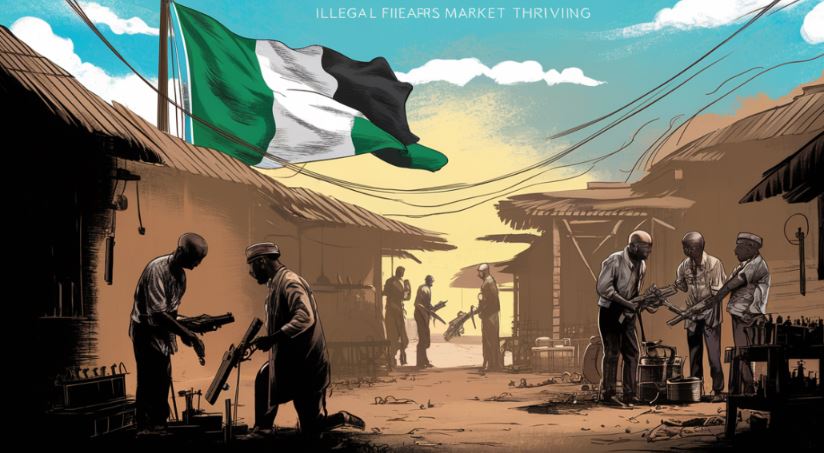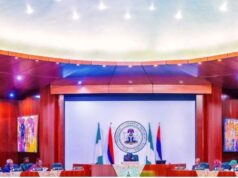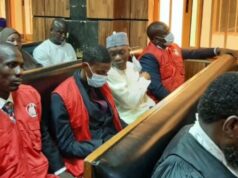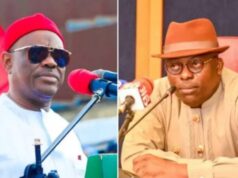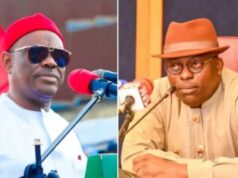![Illustration of illegal firearms market thriving in the Northern region [PHOTO CREDIT: ideogram generated]](https://i0.wp.com/media.premiumtimesng.com/wp-content/files/2024/04/XWkvZZyeSoKDVfSnMfa02A-e1714367633177.png?resize=1140%2C570&ssl=1)
Terror-induced mass killings, banditry and kidnapping in Nigeria, especially in the north, have become the monstrosities of our time, grabbing countless news headlines within and outside the shores of the country. Nonetheless, scant regard, if any, is being paid to the reasons why these phenomena have become intractable. The influx of arms through our land and sea borders and the question of their invincible entrepreneurs who serve as its oxygen have not been addressed. Doing so with seriousness and pragmatism will ultimately win the battle for the country.
This is what the National Security Adviser (NSA), Nuhu Ribadu, appeared to have evoked when he lamented over the thriving illegal weapons market in the north on 19 April, while delivering a convocation lecture at Usman Danfodio University, Sokoto, entitled, “Navigating the Maze: Addressing Multi-dimensional Insecurity Challenges in Northern Nigeria.” Thousands of lives have been lost, children orphaned and millions of citizens living in IDP camps.
He fingered poverty, unemployment, the lucrative nature of arms trafficking, with its increase in demand and supply, and its sophisticated networks, complicated by corrupt elements in the society. For example, he referenced the fact that “The cost of a single bullet can range from N2,000 to N5,000, while high calibre weapons such as (the) AK 47 rifle and rocket-propelled grenades are traded for anywhere from N1.5 million to N5 million.” Ribadu’s observation that arms traffickers and criminals have deployed “innovative methods to circumvent security checks” seems to be an indictment of the country’s security system. The country, therefore, faces a herculean task in the war, if the terrorists are strategically ahead of our security agencies in this age of technology.
It would seem that Sokoto State is a perfect location for expressing this concern. It has the highest poverty rate of 87.73 per cent in the country, while each state in the North-west – the epicentre of banditry and kidnapping in Nigeria – has a higher poverty rate than the national average of 40.1 per cent. Unemployment in the region exceeds 20 per cent, in sharp contrast to the 10 per cent to 15 per cent in the South. All of this is derived from 2019 National Bureau of Statistics (NBS) data.
However, the most important factors in our view, are the neglect of education in the north over the years by political leaders, tolerance of extremist sects within the religious space, and the rise in ethnic profiling and militia groups. All these point to critical defects in the structure of the Nigerian state. For instance, the mining of gold and other solid minerals in Zamfara and Kaduna states by entrepreneurs of violence has been left to get out of hand without control by the federal government. This is a money-spinning underground economy, heavily protected by banditry and gunrunning, in which foreign elements like the Chinese are purportedly key actors. In addition, little has been done about our porous borders along the Sahel region of Niger Republic and Chad, which link to Burkina Faso and Mali.
Niger Republic, for instance, shares borders with the seven states of Sokoto, Katsina, Kebbi, Zamfara, Jigawa, Yobe and Borno. The country is a channel for the illegal trafficking of small arms and light weapons (SALW) from Libya, which, in turn, ends up in Nigeria. Libya has been a playground for jihadists, armed militia groups and a splintered military hierarchy fighting each other for the soul of the country since 2011, when its strong man, Colonel Muammar Gaddafi was overthrown and killed.
When terrorists with sophisticated weapons ambush soldiers and shoot down a military helicopter, as witnessed last October, resulting in the death of 36 officers in the Shiroro area of Niger State, and also down a Nigerian Air Force jet along the Zamfara-Katsina border in July 2021, these smack of a security mess of immense proportions. Yet, these are not the only cases. Just a week ago, six soldiers were killed in an ambush in the same area of Niger State, which drives home the point that the country needs to think outside the box to deal with these surreal situations.
Fighting terrorism without cutting off its financing vessels is analogous to shadow-boxing. This is what Nigeria seems to be doing with its incredible aloofness in prosecuting the 400 terror financiers that Intelligence from the United Arab Emirates (UAE) and the US helped it to unravel in April 2021, under the Muhammadu Buhari regime. In one fell swoop, $782,000 was transferred by Boko Haram terror cells in Dubai to Nigeria. President Bola Tinubu should not just be shouting for foreign support and collaboration in subjugating these enemies, while at the same time continuing to act in the duplicitous and discredited manner of the former Buhari administration on the matter.
Not bringing the suspects to book starkly contradicts the whole essence of the two-day international summit on counter-terrorism that involved the African Union and United Nations, which ended in Abuja last week. The focus was on strengthening multilateral cooperation and existing combat mechanisms, in addition to enabling intelligence sharing in dealing with the scourge. PREMIUM TIMES believes that no international collaboration could be weightier than the UAE and US intelligence to Nigeria on the terror financiers, which has been incredulously ignored to date due to political expediency. The felons prosecuted and convicted without delay in the two countries, in respect of their links with Boko Haram, are serving up to 10-year jail terms each.
Nigeria’s expenditure on the Abuja security summit, without question, is huge. It has also spent billions of dollars to acquire 12 A-29 Super Tucano fighter jets and other military equipment, deployed in operations in the North, where Boko Haram and ISWAP have been hell-bent, for over a decade, on carving an Islamic Caliphate out of Nigeria. We urge northern leaders to impress on the Tinubu government to put the terror financier suspects on trial in the region’s overall interest. The indictment of the immediate past Attorney General of the Federation, Abubakar Malami, by Femi Falana (SAN), still rings bells: “The suspects have been shielded from prosecution and exculpated by the Chief Law Officer of the Federation in spite of the overwhelming evidence already assembled against them by the team of investigators.”
Prosecuting enablers of terror is part of getting to the roots of the rot, besides enthroning good governance, which will fight poverty, as emphasised by the president in his address at the summit. Otherwise, the region which has suffered the most from this anomie will continue to witness, unfortunately, horror spectacles, epitomised in the abduction of 276 Chibok school girls in 2014, the recent kidnapping of 280 school children from Kuriga in Kaduna, the Dapchi, and then Buni Yadi school attacks and killings, earlier in this nightmarish epoch.




































